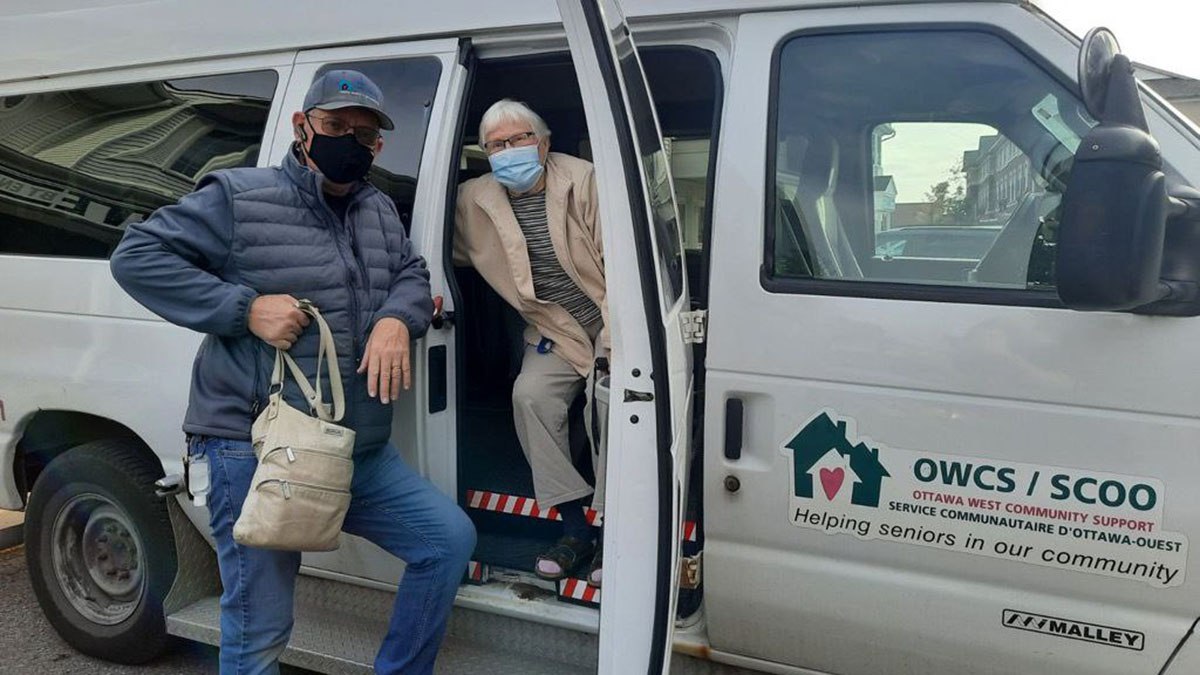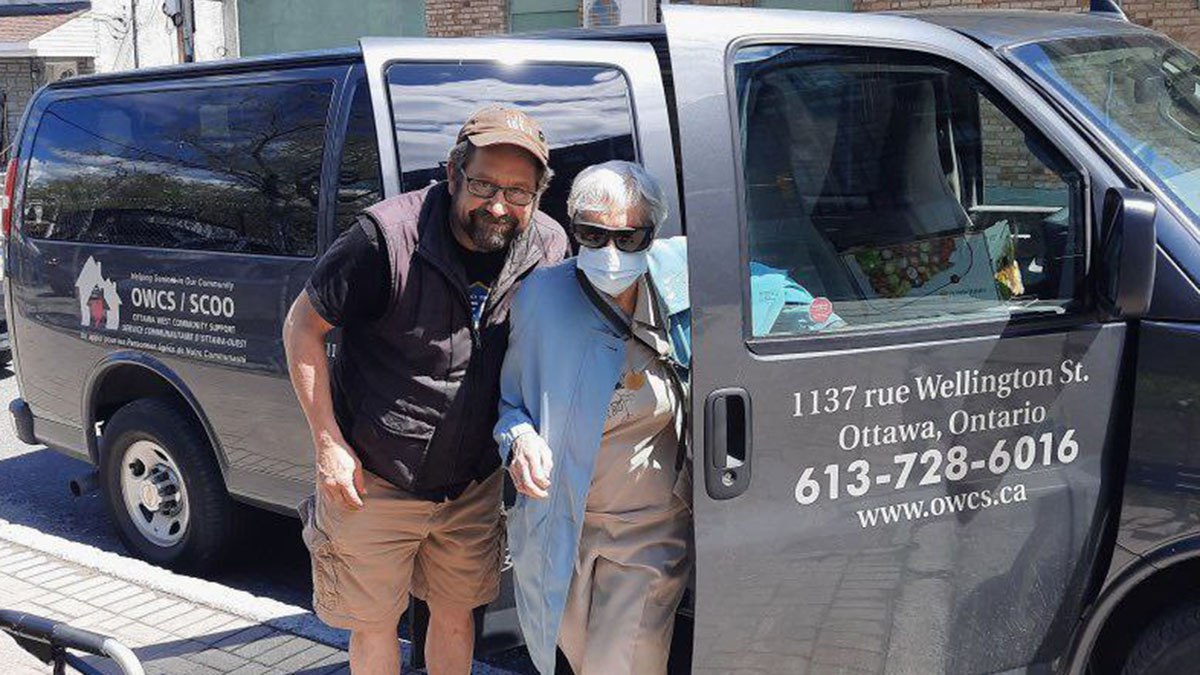Community-based support and health centres across Ottawa say there is an urgent need for volunteer drivers to take clients to essential health appointments.
The transportation program at Ottawa West Community Support in Hintonburg – which provides about 14,000 rides a year – relies on a mix of volunteer and paid drivers to shuttle clients to and from medical appointments, pharmacies, grocery stores and the centre’s Wellington Street location, according to senior manager Amy Bevilacqua.
But the number of volunteer drivers has dwindled since the pandemic and that has Bevilacqua worried.
“We used to have a lot more volunteers, but we’ve lost quite a few over the past couple of years,” she said. “Right now we have about five volunteers involved in the transportation program, but ideally we would have more than 10, so we are actively seeking out volunteers.”
Accessibility to health care affects many in Ontario, and those with disabilities and mobility issues, such as seniors, face larger barriers. Many do not have a car or the means to access appointments, medication and counselling services by themselves so they depend on programs in their communities.
Non-profit organizations, such as Ottawa West Community Support and South East Ottawa Community Centre, offer programs that make essential services like health care more accessible to seniors and people with disabilities.
For decades, both have offered transportation to medical appointments. But currently, these services lack enough volunteers and funding.
Support programs in ‘urgent’ need
These types of programs are often dependent on several different sources of funding, explained Kelli Tonner, executive director of the South East Ottawa Community Health Centre, which offers a medical transportation program among other health related services.
Both organizations are partially funded by the provincial Ministry of Health, as well as the City of Ottawa. They also rely on donations and fundraising efforts. Funding for the transportation program is rolled into a broader fund that supports six additional services the organization provides. Current funding for all of the services at SEOCHC is around $380,000.
“We are in urgent need of additional funding.” Tonner said. “We could easily double or triple that and still struggle to meet the needs in our community.”
Additional funding would allow these centres to hire more community support staff members to assist in the recruitment, training, vetting and support of the volunteer drivers. It would also allow investments in digital resources. These new resources could assist in forming further partnerships between organizations and build collaboration between medical transportation programs.

Volunteer participation essential
To promote volunteer participation, Bevilacqua said OWCS is flexible about how much time one can commit to driving. The centre regularly puts out calls for volunteers on social media and in newsletters.
In a testimony on the Ottawa West Community Support’s website, one client said: “After my hip surgery, I don’t know what I would have done without my volunteer driver.”
OWCS drivers are much more flexible than services like Para Transpo, especially in helping with the extras, Bevilacqua added.
“The client might leave the doctor and need to go to the drug store to pick up a prescription, and we can do that for them.”
Volunteer drivers use their own cars at OWCS, and are not reimbursed for gas. Bevilacqua said she recognizes the strain this puts on the volunteers, especially with high gas prices.
She says more funding from the city would not only be an investment in health services that benefit communities, but could allow them to reimburse costs borne by volunteers.
Linda Hayes is an OWCS volunteer. She mainly works in administration, calling and reminding clients about their pick up time for their appointments.
“It takes a stressful day and makes it a little less stressful because they know who’s going to come and get them.”
– Carolyn Calder, community support services coordinator at Good Companions
Hayes said volunteer participation is crucial to the success of OWCS programs.
“I don’t know what they’d do without volunteers,” she said. “Every organization that is involved in community care, especially with the elderly, needs extra people to help them to do things they can’t anymore.”
Carolyn Calder, a community support services coordinator at the Good Companions, a non-profit support centre in LeBreton Flats which also provides transportation, echoes the essential nature of these programs.
“If you talk to the people that use our service, they just say, ‘Oh I don’t know what I’d do without you. I need this. I wouldn’t make it to my appointments,'” she said.
“It takes a stressful day and makes it a little less stressful because they know who’s going to come and get them.”
As a volunteer, Hayes has observed the impact of the transportation program on the lives of seniors.
“I know some of them are on a very limited budget and if they had to take taxis or even buses to get to their appointments, it would be a great hardship for them,” she said.
The Institute of Ageing in Canada released a report in 2020 called the National Seniors Strategy, which emphasized the importance of transportation services.
“It is imperative to ensure that various alternative and accessible transportation options are available,” the report said. “Therefore, programs that help older adults maintain their independence and mobility and allow them to travel wherever they want to go in the community safely, and in an accessible and affordable way, are extremely important.”
The study determined that meeting senior’s health and well-being needs through community programs can maintain the overall physical and mental health of these individuals.
Hayes reiterated the benefits to mental health the programs can have, saying volunteers form meaningful companionships with the clients.
“When you have no one to talk to, you start to feel very differently about life. It brings joy to their lives to be able to socialize, whether it be seeing their driver every week or coming to the centre.”
Medical transportation services important
Even though Somerset West Community Health Centre doesn’t provide a medical transportation service specifically for seniors, outreach worker Job Moise said he appreciates the value of such services for isolated seniors in the community.
Medical appointments require clients to be available at such specific times. “If you can’t find transportation, to try to get to that appointment that’s two weeks away, and you miss it, because you don’t have access to transportation, you might not have another chance to see a doctor for another month,” Moise said. “Transportation is super important to be able to make that appointment so that it doesn’t get postponed even further.”
If community organizations were forced to discontinue transportation programs, Moise said the effects would be “detrimental.”
Tonner, from South East Ottawa Community Health Centre, echoed this statement.
“I think lives are at stake,” she said, adding a lack of safe transportation access inevitably results in health conditions worsening because of the inability to reach proper medical care. Access to transportation is the key to preventing this.
Quoting her grandmother, Tonner said, “an ounce of prevention is worth a pound of cure.”




